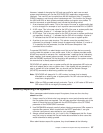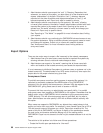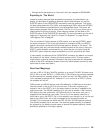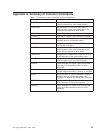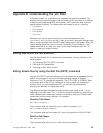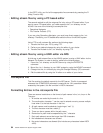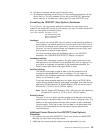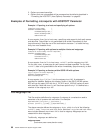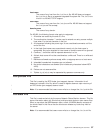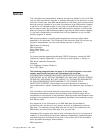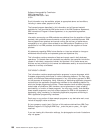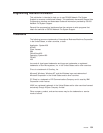10. No tabs or line feeds can be used in the path name
11. All characters following the pound sign ’#’ are considered comments until the
end of the line. The only exception to this rule is the HOSTOPT parameter,
which uses the ’#’ character as a starting point for each HOSTOPT entry.
Formatting the HOSTOPT (Host Options) Parameter
In /etc/exports, you can provide additional information for each export entry
related to the remote NFS clients who will access your entry. For each remote NFS
client, you can specify the following items:
/path_name #HOSTOPT HostName=client1,
PathNameCodePage=NNN,
DataFileCodePage=NNN,
NoWaitForWrites
HostName
The name of the remote NFS client for which you are specifying additional
export options. You should specify this client by name in one of the lists as
a host that has access to this export entry. You can also use netgroups for
this entry. You can list multiple clients and netgroups for every entry, each
with its own list of specific export options.
For more information about the HostName option on the HOSTOPT
parameter, see “CHGNFSEXP/EXPORTFS Display” on page 31.
PathNameCodePage
The path name code page is used for the path name components of the
files exported to and mounted on the specified NFS client or netgroup. For
any clients or netgroups not specified on the HostName parameter, the
default network path name code page (ASCII) is used.
DataFileCodePage
The data file code page is used for data of the files exported to and
mounted on the specified NFS client or netgroup. For any hosts not
specified on the HostName parameter, the default network data code page
(binary, no conversion) is used.
If the entry being exported resolves to an object within the QSYS.LIB file
system and the network data file code page is specified, then data files are
opened by OS/400 Network File System Support. NFS will use the open()
API with the O_TEXTDATA and O_CODEPAGE options.
Note: See the
System API Reference,
SC41-4801 book for more details on
the open() API and the O_TEXTDATA and O_CODEPAGE options.
NoWaitForWrites
The NoWaitForWrites option specifies whether write requests are handled
synchronously or asynchronously for the NFS client or netgroup name. The
absence of this option means that data will be written to disk immediately
(synchronously). If this flag is used, then the data is not guaranteed to be
written to disk immediately and can be used to improve performance
(asynchronously).
Additional Format Rules for the HOSTOPT (Host Options)
Parameter
1. The options must start with #HOSTOPT. There must only be one #HOSTOPT
although you could have many host names.
2. Additional host names and their options must be separated by a colon.
Appendix B. Understanding the /etc Files 95



